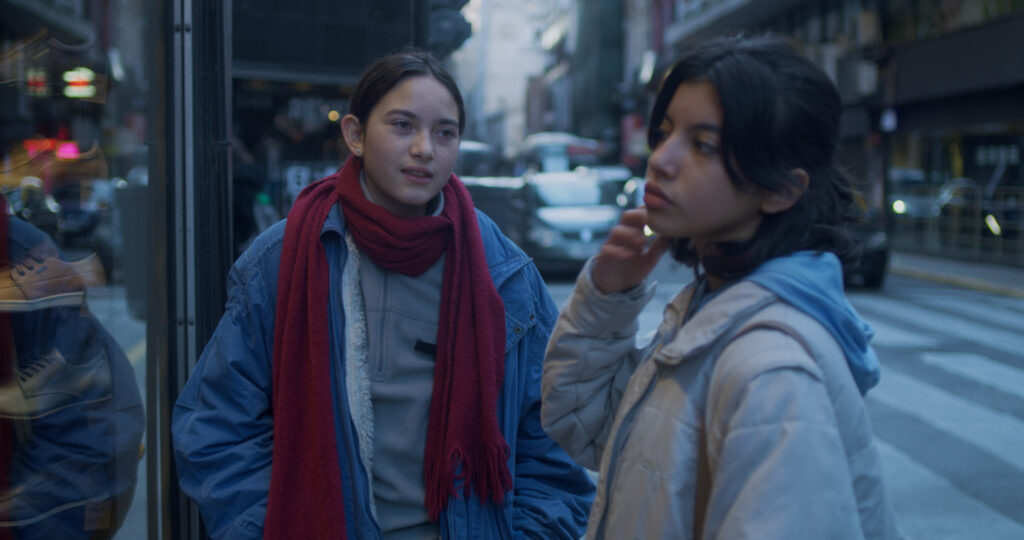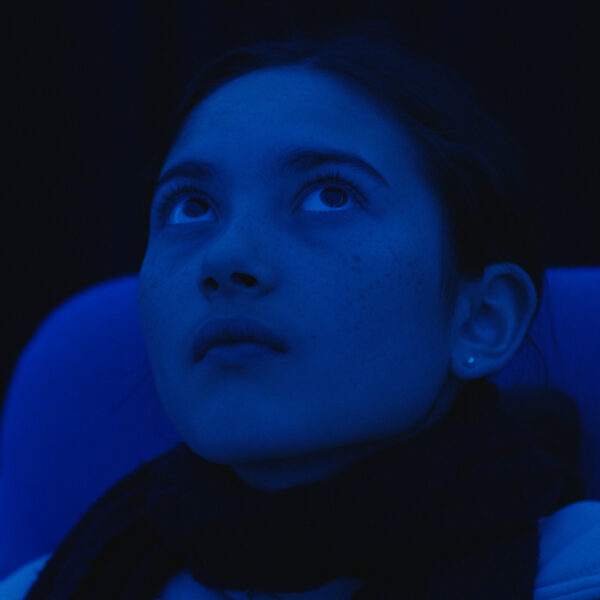A review of "Los tonos mayores"
"Duuuuuut - dut - dut - duuuuuut - dut - duuuuuut", hums 14-year-old Ana to her friend Lepa as she listens to the strange signals she feels from the metal plate in her arm.
This plate was inserted into her arm after an accident - and anyone who watches the film "Los tonos mayores" (engl.: "The Major Tones") very carefully might conclude that this must also be the accident in which Ana's mother died.
Ingrid Pokropek's debut film celebrates its international premiere at the Haus der Kulturen der Welt on Saturday, the audience is enthusiastic and especially the young lead actress Sofía Clausen, who was only twelve years old when filming began, receives a lot of applause. It is a film about a fantastic mystery of secret messages, a film full of music and full of witty characters and twists.
Ana lives in Buenos Aires with her father Javier (Pablo Seijo), an artist. It's the winter holidays and her metal plate has been receiving these mysterious impulses for a while - but where are they coming from? When Ana asks her friend (Lina Ziccarello) for advice, Lepa notes down the rhythms and composes a song from them. But she can't help Ana much more.
Ana only comes closer to solving the mystery by chance some time later: after an argument with Lepa, the young soldier Pablo (Santiago Ferreira), whom she meets on the street, reveals to her that the rhythmic signals are Morse code. Now there is no stopping Ana: she is determined to find out where these signals are coming from, who is sending them and, above all, what they mean.
But cracking the code is not that easy. And while Ana at least thinks she is getting better and better at understanding the messages ("Ox - Don't forget me - Centaur"), which seem meaningless at first glance, her relationship with her father is clearly suffering from her ever-increasing urge to decipher the encrypted messages. What's more, he has absolutely no idea what is bothering Ana all this time, and he begins to worry more and more.

We (and many different, very special characters in the course of the film) accompany Ana on her search for clues across the city, observe unexpected encounters and ask ourselves, together with Ana, what the meaning of the mysterious signals is. But the question that Pokropek raises above all is whether we really always need an answer to the riddles that life so often presents us with. And whether a supposed answer will really take us as far as we hope it will.
There are some outstanding moments in a very empty restaurant, for example, in which chance or fate brings several characters together and thus enables unprecedentedly absurd but very entertaining dialogues; the waiter in particular blossoms in his role here and undergoes a very brief but touching character development. Later on, the film is also characterised by the refreshing changes in perspective that Ana and Lepa undergo, which sometimes put everything they previously thought they knew about the messages into perspective. But at the same time, Pokropek gives the audience a very inspiring, hopeful philosophy of life with this and other original ideas, which questions whether we as humans should really know or do everything and at the same time pays homage to the beauty of unexplored secrets, untouched areas and inexplicable phenomena. The music also supports this atmosphere and, like the rest of the very lovingly crafted score, makes an impressive contribution to the film's message.
"Los tonos mayores" is a real enrichment and for me represents the kind of children's film that I would like to see at the Berlinale. Thanks to the very authentic and approachable narrative style, the director puts herself at Ana's eye level and that of all children and the audience doesn't doubt Ana's story for a second, as many adults in the film probably would. The strained relationship between Ana and her father in the film is also very well done and is a particularly touching part of the film, because although the loss of her mother is only really touched on, we accompany the two of them on their very difficult journey. The audience is taken seriously and inspired by imaginative and varied surprises, and the atmospheric music in particular contributes to a long-lasting ambience.
The film is particularly suitable for children aged 10 and over, which I can only agree with, although some of the deeper thoughts and themes are aimed more at an older target group, which is why it also represents a transition from Kplus to 14plus films in a certain way.
It's certainly worth going to the cinema and "Los tonos mayores" is definitely one of my favourites for the Crystal Bear.

